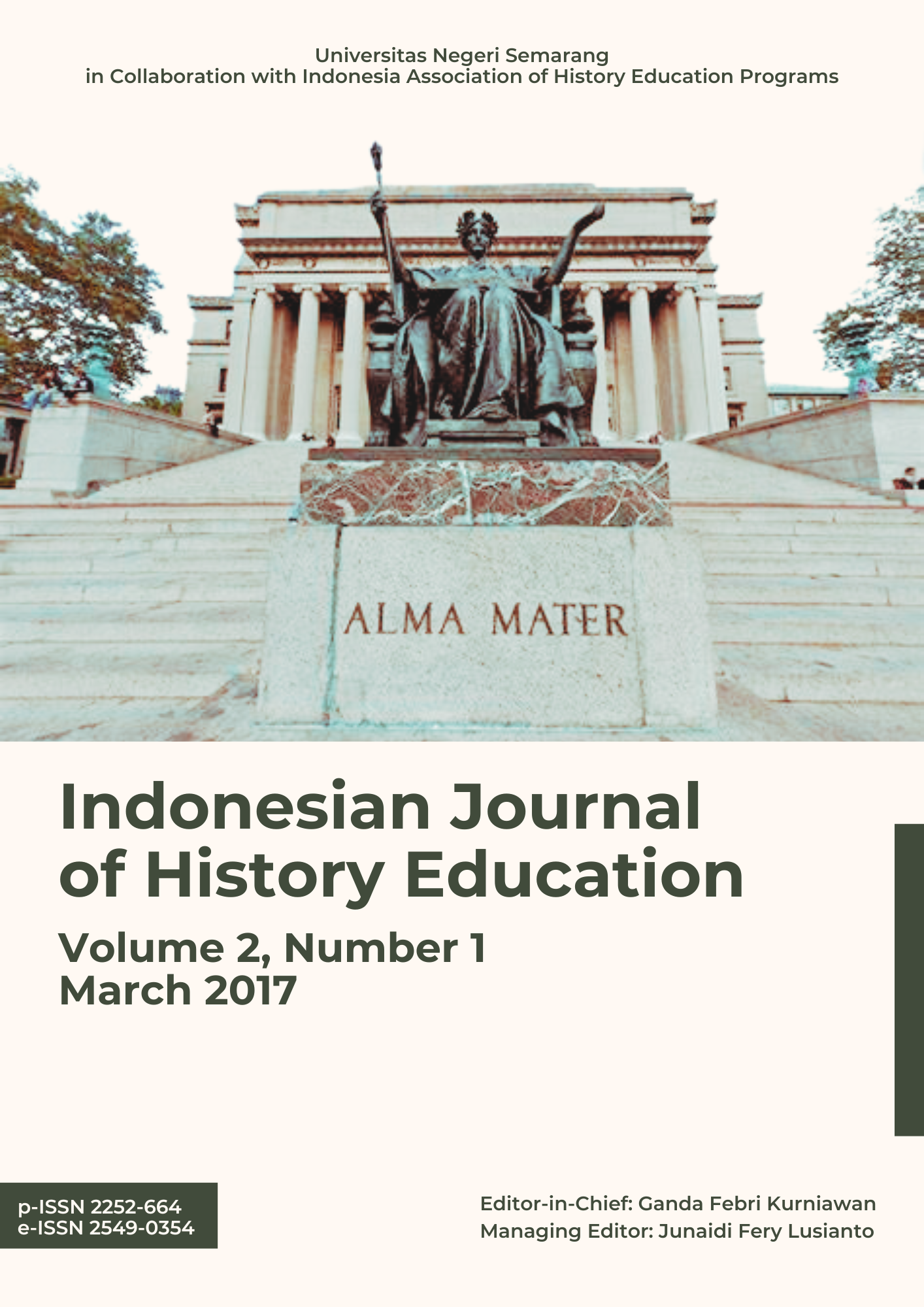Teachers' Efforts to Overcome Barriers to Students' Affective Assessment in History Learning at SMA Negeri 2 Batang
Abstract
The objectives of this study: (1) Knowing the implementation of the assessment of the affective aspects of students in teaching history in the classroom. (2) Knowing the barriers the teacher faces in assessing students' affective aspects at SMA N 2 Batang. (3) Analyzing the teacher's efforts to overcome history learning barriers in assessing the affective aspects of students at SMA N 2 Batang. The results of this study indicate that in the process of applying the student's attitude values, the teacher found several barriers that occurred in the process of learning history. In accordance with the objectives of the 2013 curriculum, which focuses on student affective assessment, this assessment is still experiencing barriers in the assessment process, which is based on the background of the teacher and students. The assessment of the affective aspects of students is carried out by means of observations, journals, self-assessment, or among friends. To overcome these barriers, the teacher made several efforts, including that every teacher had tried their best to give the best to students. In addition, teachers conduct evaluations to continue improving their performance in conducting effective assessments; everything is prepared optimally to run smoothly.
References
Arikunto, S. (2009). Dasar-dasar Evaluasi Pendidikan. Jakarta: Bumi Aksara.
Hasan, F. (2015). Kendala- kendala Yang Dihadapi Guru Sejarah dalam Menilai Aspek Afektif pada Pembelajaran Sejarah di SMA N 1 Wiradesa Kabupaten Pekalongan Tahun Ajaran 2014/2015 (Skripsi). Universitas Negeri Semarang, Semarang.
Miles, M. B., & Huberman, A. M. (2007). Analisis Data Kualitatif: Buku Sumber Tentang Metode-metode Baru. Jakarta: UI Press.
Moleong, L. J. (2013). Metodologi Penelitian Kualitatif . Bandung: PT Remaja Rosdakarya.
Muhtar, T. (2014). Analisis Kurikulum 2013 Ditinjau dari Aspek Nilai Karakter Bangsa. Mimbar Sekolah Dasar, 1(2), 168–175.
Musfiqon. (2012). Pengembangan Media dan Sumber Pembelajaran. Jakarta: Prestasi Pustaka Raya.
N, I. P., & Sofyan, H. (2016). Hambatan-Hambatan Pelaksanaan Kurikulum 2023 di SMK Negeri 1 Sayegan Yogyakarta. Jurnal Pendidikan Otomatis, 14(1), 9–15.
Nurmasyitah, & Hudiyatma. (2016). Kendala Guru dalam Merumuskan Instrumen Penilaian Pada Pembelajaran IPS Sesuai Dengan Ranah Afektif di Gugus 1 SD N Uteun Pulo Seunagan Timur Nagan Raya. Jurnal Pesona Dasar, 2(4), 48–62.
Pramono, S. E. (2014). Kinerja Guru Sejarah: Studi Kausal Pada Guru-Guru Sejarah SMA Di Kota Semarang. Paramita: Historical Studies Journal, 24(1), 114–125.
Rianti, I. (2016). Analisis Pembelajaran Sejarah Kebudayaan Islam (SKI) Berbasis Kurikulum 2013 Pada Materi Bani Abbasiyah Kelas XI IPS di MAN 1 Surakarta Tahun Ajaran 2015/2016. Candi: Jurnal Pendidikan Dan Penelitian Sejarah, 13(1), 126–142.
Sari, N. I. (2016). Penilaian Afektif dan Psikomotorik dalam Pembelajaran Sejarah di SMA Negeri Se Kabupaten Kendal (Skripsi). Universitas Negeri Semarang, Semarang.
Setiadi, H. (2016). Pelaksanaan penilaian pada Kurikulum 2013. Jurnal Penelitian Dan Evaluasi Pendidikan, 20(2), 166–178. https://doi.org/10.21831/pep.v20i2.7173
Slameto, S. (2015). Rasional dan Elemen Perubahan Kurikulum 2013. Scholaria: Jurnal Pendidikan Dan Kebudayaan, 5(1), 1–9. https://doi.org/10.24246/j.scholaria.2015.v5.i1.p1-9
Sodiq, I., Suryadi, A., & Ahmad, T. A. (2014). Program Guru Menulis: Upaya Peningkatan Kompetensi Profesional Guru Sejarah Dalam Penulisan Karya Ilmiah di Kabupaten Semarang. Rekayasa: Jurnal Penerapan Teknologi Dan Pembelajaran, 12(1), 42–47.
Sudijono, A. (2016). Pengantar Evaluasi Pendidikan. Jakarta: RajaGrafindo Persada.
Sudjana, N. (2007). Penelitian dan Penilaian Pendidikan. Bandung: Sinar Baru Algensindo.
Sugiyono. (2013). Metode Penelitian Kuantitatif, Kualitatif, dan R&D. In Alfabeta, cv.
Suryani. (2012). Strategi Belajar Mengajar. Yogyakarta: Ombak.
Usman, Moh. U. (2007). Menjadi Guru Profesional. Bandung: Remaja Rosda Karya.
Utomo, C. B. (2010). Implementasi TQM Berorientasi Hard Skill dan Soft Skill dalam Pembelajaran Sejarah SMA di Kota Semarang. Paramita: Historical Studies Journal, 20(1), 72–81.
Utomo, C. B. (2015). Model Pengembangan Perangkat Pembelajaran Sejarah Berorientasi Metakognitif Jenjang SMA. Paramita: Historical Studies Journal, 25(1). https://doi.org/10.15294/paramita.v25i1.3426
Widja, I. (1989). Sejarah Lokal Suatu Perspektif dalam Pengajaran Sejarah. Jakarta: Departemen Pendidikan Dan Kebudayaan Dirjen Pendidikan Tinggi Proyek Pengembangan LPTK.
Widja, I. G. (1989). Dasar-Dasar Pengembangan Strategi serta Metode Pengajaran Sejarah. Jakarta: Departemen Pendidikan dan Kebudayaan.
Widoyoko, E. P. (2010). Evaluasi Program Pembelajaran. Yogyakarta: Pustaka Pelajar.
Copyright (c) 2016 Lisa Rismawati

This work is licensed under a Creative Commons Attribution 4.0 International License.
Copyright Notice
An author who publishes in the Jurnal Indonesian Journal of History Education agrees to the following terms:
- Author retains the copyright and grants the journal the right of first publication of the work simultaneously licensed under the Creative Commons Attribution-ShareAlike 4.0 License that allows others to share the work with an acknowledgement of the work's authorship and initial publication in this journal
- Author is able to enter into separate, additional contractual arrangements for the non-exclusive distribution of the journal's published version of the work (e.g., post it to an institutional repository or publish it in a book) with the acknowledgement of its initial publication in this journal.
- Author is permitted and encouraged to post his/her work online (e.g., in institutional repositories or on their website) prior to and during the submission process, as it can lead to productive exchanges, as well as earlier and greater citation of the published work (See The Effect of Open Access).
Read more about the Creative Commons Attribution-ShareAlike 4.0 Licence here: https://creativecommons.org/licenses/by-sa/4.0/.




